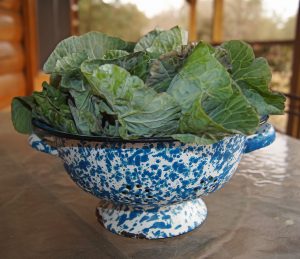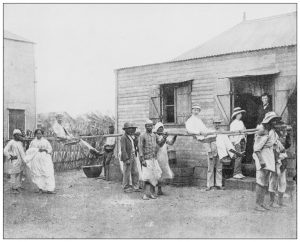What do you think of when you think of “American” food? Burgers, fries, tacos, pizza, apple pie (sounds great, if not the healthiest of options!)…When looking at those iconic dishes, it becomes pretty clear that American food is a mix of cultures just like our country itself. German burgers, Belgian fries, Mexican tacos, Italian pizza…even apples had to be brought over by European colonists from Asia! But only talking about these “Western” foods is leaving out a lot of history, and a lot of American food culture. It is important to recognize that much of our American cuisine can be traced back to the slave trade and African ingredients and methods that were brought here with the people forced to leave their homes. African foods, and African American chefs, have influenced what we eat, how we eat it, and how we share it.
A Culture Preserved and a Culture Changed
American history doesn’t start with 1776, and our country’s beginnings definitely were not only centered in the cities of the Northeast coast. By the early 1600s, plantations were popping up in the South, where eventually the landscape was dotted with large houses in the tradition of English manor houses.
The settlers in the South sought to keep the traditions of living a lavish lifestyle and maintaining a grand household, and they looked for domestic help to achieve this. So they enslaved people not only to work in their fields, and also to work in their houses, most notably as cooks of the household.
These African American cooks wove themselves into the cultural heritage of America through their prominent, if not always recognized, position in Caucasian households. They held the reputations of their enslavers in their hands and were the people who allowed them to showcase their lavish lifestyle to others.
They crafted the recipes for food that is now quintessentially Southern American, and they were good at what they did. Some names preserved by history, like Hercules, George Washington’s cook, and James Hemings, who was a cook at Thomas Jefferson’s Monticello, were highly trained, and they became the nation’s first celebrity chefs.
Enslaved people also had an impact on the culture of the people they were enslaved by. African Americans kept their own traditions alive, and it was woven into the lives of Caucasian Americans. For example they brought with them the concept of “teranga,” a West African idea of neighborliness and hospitality, which became one of the defining ideas behind Southern hospitality.
According to African American culinary historian Michael Twitty, “These are… values that were taught to White kids raised by Black women,” Twitty says. “[W]e were taught to believe that Southern hospitality was grounded in some sort of, like, medieval pass down. It was this thing that we… inherited from our African side mixed with a little bit of European and Native concepts of hospitality and neighborliness.”
The Most American of All Cuisines?

America’s dark history of slavery brought with it the gift of new ingredients and new methods of food preparation. African Americans became a major part of our shared culinary history, through the “recipe books” of slaveholding women (whose recipes very noticeably changed from English dishes in the 1700s to African-inspired dishes in the 1800s), as cooks in prominent households, and even as restaurant owners.
Take, for example, Thomas Downing, who was one in a line of African American restaurateurs in the 18th and 19th centuries who focused on oysters (the “Big Mac” of the 19th century) and seafood. Downing, born into slavery in Chincoteague, Virginia, was known for running the best oyster house in New York, and became so famous that Queen Victoria sent him a gold watch. Downing, like many African American caterers, restaurateurs, and chefs, used his wealth and position to fund abolitionist causes.
While African American cooks had an influence in the North with these seafood restaurants and through women hawkers selling things like pepperpot (a type of West African gumbo) in the streets of cities like New York and Philadelphia, their biggest influence was in the South. It was there that they both grew and prepared so much of the food, and where one of our most traditional of American cuisines was born – soul food.
Forget burgers and pizza, soul food, and its close relative Southern cooking, is the ultimate hybrid of our many American identities. Many of us don’t spend much time thinking about its origins (we spend more time drooling over it than analyzing it!), but this cuisine’s rich and important history ties us all to our history and the roots of a large percentage of our population. Certain staple ingredients that we consider so important to American cooking were actually brought here with the slave trade, and their preparation was shaped by African Americans. For example:
- Rice – This staple didn’t actually exist in the Western Hemisphere until the slave trade. It was brought over with enslaved people to help keep them alive. The enslaved people who grew it and cooked it kept their traditions alive by preparing it in ways that we will still recognize today, such as in one-pot stews like jambalaya.
- Okra – This slimy vegetable was also brought here on slave ships and was used as a soup thickener, a coffee substitute, and even as material for rope. Now we see it fried, or stewed in dishes like gumbo (whose name comes from the Bantu word for okra!)

- Greens – There may be no greater link to African cuisines than the technique of boiling greens. Many African countries have dishes reminiscent of Western dishes like collard greens, and even the practice of dipping things like cornbread in the juices left over from the cooking process can be traced back to traditional African dishes.
- Pork – While eating pork didn’t originate with the slave trade, it was African American cooks who honed the time-honored and sophisticated art of barbecue. Because enslaved people were given the worst cuts of meat, they drew from their traditional African methods to hide the bad taste of their food. They used things like spicy peppers and vinegar, which have become the base of many types of Southern barbecue sauces. It was also generally the grueling job of enslaved people to preserve meat (since there were no refrigerators to keep it fresh!), so they are the ones who handed down to us our methods of curing meat.
Food like these, and many others, that were brought here for and prepared by enslaved Africans shaped the way that both the enslaved and the enslavers lived. They shaped the diet of the time, and even our diets today. They had an impact on culture through the work they were forced to do. The dishes that enslaved Africans created formed the basis for Southern cuisine and soul food, which was a term popularized in the 1960s to describe African American’s home cooking.
This food became a language, and a very American one, because it combines our dark history and a strong sense of hope and pride. According to journalist and food historian Donna Battle Pierce, “As a culture, we had lost our language. We had lost our family… all of the things that bind a culture together,” so the term soul food was embraced because it was a way “to talk about what we shared. And that sharing felt so good to have something in common with all of us with brown skin.”

